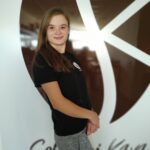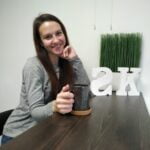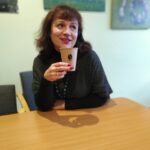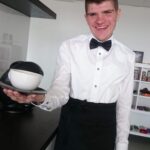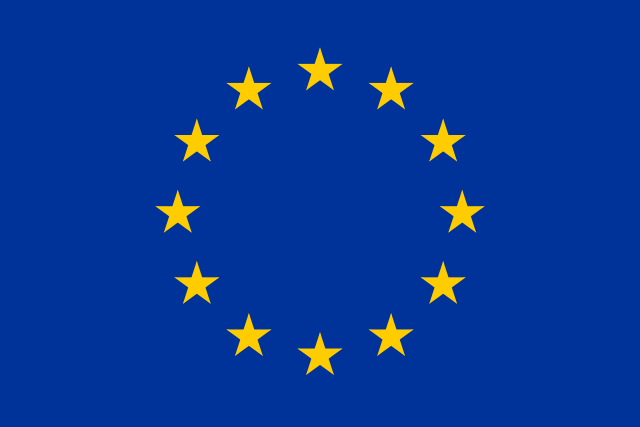One of the greatest experiences was serving coffee at a coffee festival in Vilnius. After that, I felt a lot more confident and found it easier to believe in myself. I have proved that I have the skills to work in a cafeteria. I have also enjoyed learning from others in the teams.
Bring together ten extraordinary people with an idea to improve their community, and lots of coffee. The result: a café with a difference! Addressing the discrimination faced by young disabled people, this solidarity project shows how working together can build new friendships and overcome prejudice.
For me, participation is all about having an idea and working with others to make it happen. For example, when I say to Ieva who is a youth worker that we need music in the coffee shop, she brings a music player. My message to young people is simple: ‘Try it! If I can do it, you can do it too!
The coffee makers themselves, two young people with disabilities, Paulius Maskaliovas and Ugnė Kostygovaitė, and three youth workers, Ieva Kaupaitė, Lina Trebienė and Aistė Pagirienė gave us their thoughts and reflections on the Solidarity Coffee-2 project:
Who came up with the idea of selling coffee to the community?
One day Paulius said, ‘I want a job that helps our community, and I want to make new friends. Let’s go for a coffee!’. We are youth workers. Our task is to listen, understand and help young people implement their ideas, so, with five super motivated young people, the rest was easy! All we needed to do was complete the project application form. We won funding for the initial Solidarity Coffee project in 2018, and again for this second project in 2020.
What was the aim of the project?
As youth workers, we want to help young people improve their lives and make them feel part of their community. They all face different challenges, but for disabled young people in Lithuania life can be especially tough. They still face exclusion in many daily situations and are often ignored by the rest of society. By serving coffee to passers-by, our mentally disabled youngsters get the opportunity to chat with customers and begin to break down some of those prejudices. Like Paulius, most of our young people are really good at opening up conversations and putting people at ease. In this way, our young people have made many “coffee friends” who they could have never met otherwise.
What kinds of planning and preparation did you have to do?
Well, first we had to learn how to make and serve good coffee! But we also had to train our young people about customer service and how to engage with people. We started small, serving coffee on the streets and in local parks, but soon we began receiving invitations to bigger events. We went to youth and sport festivals, schools, business lunches, conferences and picnics. Aside from our mobile café, we also run a small coffee shop at our organisation which is a perfect place for hosting customers and training new staff. When the first project came to an end, participants were determined to keep it going and trained their friends to take over.
How did you apply for the Erasmus+ funding?
We have been involved in Erasmus+ projects for a long time, both as coordinators and
partners. In case of this project, the idea came from the young people themselves and the application was completed together with them. Everyone had the opportunity to express their opinions and ideas. Of course, the project team shared responsibilities, everyone had a role.
Administration and logistics were taken care of by the project coordinator. However, all the issues that arose were discussed with the young participants for whom being involved in all stages of the project and learning to become independent is very important.
How is the current solidarity project run?
Solidarity Coffee-2 started in 2020 with five new participants, while members like Paulius from the first project have become mentors. Former participants were able to share the benefits of their experience with the new group and keep things running smoothly. While the first group had been learning the ropes, the second group has worked more on developing a theme for each season of the coming year. For example, for Valentine’s Day they planned a romantic setting and decorated everything with red hearts. We used roleplay exercises to practice dealing with customers and serving coffee, but very quickly our newer team members were running things on their own, including carrying out evaluations and Youthpass certificates. This year’s plan includes creating a Europass CV as well!
What have you learned during these activities?
Paulius is now a professional barista, but he has also learned the importance of being open to ideas from his co-workers. Now his dream is to buy a coffee bike which functions as a mobile caffetteria and to develop his social business idea by selling coffee on the street. Ugnė also feels she has gained a lot: she has learned new skills, enjoys the art of making coffee and loves communicating with people at the events.
What challenges have you encountered?
With so many cafés out there, it was important to make our project as visible and attractive as possible. We spent a lot of time coming up with a brand and a logo that people could easily recognize. But the pandemic has presented the biggest challenges. We had to make sure that our mobile coffee stations were safe, protecting ourselves and our customers by following social distancing rules. Paulius commented that ‘sometimes we have had minor arguments in the team, but we agreed to do our best to be punctual, stay positive and support each other.’ Staying in touch with customers via social media has also been challenging and important. We are active on Facebook, Instagram and TikTok, and are experimenting with video posts as well.
What has made Solidarity Coffee-2 a success?
It is about happy and fun young people who have developed a special bond with their clients. Our coffee is popular because it is not just about coffee! When people hear the name of our city, they know it as ‘the home of Solidarity Coffee’. We have a loyal following, and often customers bring their friends to try our coffee.
About the project
Supported by:
European Solidarity Corps / Solidarity Projects
EU Youth Programme Priority:
Inclusion and Diversity
Topic:
Youth Participation / Skills Development and Volunteering
Youth Goals:
Visibility:
Organisations involved:





